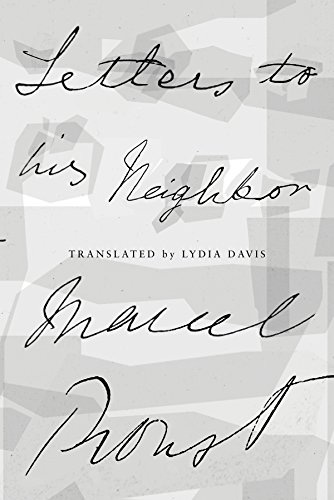I'm fascinated with a writer's residence. A writer like Marcel Proust, who lived in Paris yet, couldn't stand outside noise. He had lined up cork in his room to keep sounds out, but where does one stop when it becomes an obsession? Ironically enough, or perhaps cruelty playing at fate, his upstairs neighbor was a dentist with his office right over his bedroom. Proust deals with this problem by addressing correspondence with the upstairs neighbor's wife, Mme Williams. Often sent with flowers, compliments, or books. Proust, even at his wit's end, was a charmer. Any other temperament could have been war. Alas, it was more of a problem for the whole building. The upside of this situation is that Proust and Mme Williams became close friends. She made music in her and her husband's apartment, and often Proust complimented the sounds above.
"Letters to His Neighbor" is a very brief small book. All the correspondence is from Proust, so you don't get Mme Williams's commentary in the above narrative. Still, and not surprisingly, the letters by Proust are written so beautifully. One wonders if the world would be a better place on Social platforms like Facebook if writers of Proust's talents were on it. The book is beautifully translated from French to English by the great Lydia Davis. Her afterword focuses on the relationship between the two neighbors and comments on the Proust apartment, which I found fascinating. There is even a floor plan of Proust's apartment. Also, we get what living inside Proust's headquarters was like. According to Davis, the apartment was stuffed with his family's furniture, and it must have been like the world within a world.
"Letters to His Neighbors" is slight, but it’s the devil in the details and gives some light to "Swann's Way" and his other volumes of the same series. Proust fanatics will want this, but again, I find the writer's lifestyle of great interest. As a guy who sits behind his computer, I can imagine what Proust had to go through for his work. After all, noise or quiet is a subjective view of the world.















Yes, being older is an important step toward not only understanding the slow pace and incredibly detailed descriptions, but place and feelings becomes richer, more like our own memories now. Thanks.
This sounds like a wonderful kind of book that I love to read. Especially if Lydia Davis translated. I’ve read the first three books of Remembrance of Things Past, the old Scott Moncrieff translation which is a bit of a slog. It was the only one available when I began it. I must read Lydia Davis’ translation. Thanks Tosh.